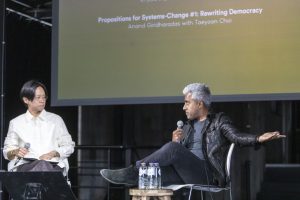Speaking at the Afield forum in Brussels, Giridharadas calls for a re-democratisation of art, and argues a vote for Harris is a vote for the continuation of democracy.
Anand Giridharadas is clear about both his love and disdain for New York’s Metropolitan Museum of Art. The writer and journalist opened his panel discussion at the Afield Forum on art and systems change in Brussels by talking about his book, Winners Take All, in which he outlines how the wealthy use philanthropy to maintain systems of power.

Anand Giridharadas speaking at AFIELD Forum 2024 (Photo by Jan Locus)
In a time of increasing wealth inequality and the number of billionaires, Giridharadas referred to philanthropic efforts to reduce poverty as a drop in the wide bucket needed to close income and prosperity gaps. “If we have more drops in the bucket, the bucket might get filled,” said Giridharadas. “But we have all these problems because billionaires use do-gooding to protect morally indefensible systems. They are interested in change at the top, so long as the change doesn’t come for them.”
According to the author, one of the most notable ways the wealthy have used philanthropy to whitewash moral crimes is by funding art and museums. He referenced famous donors such as the Sacklers who founded the drug company, Perdue Pharma, which is accused of knowingly overprescribing opioids. Giridharadas argued that the problem isn’t just that mega-donors use philanthropy to clean their reputations, but that it makes the art world overly reluctant on the wealthy for funds, which in turn maintains systems of power that artists should be combatting.
“If you are an artist that wants to change things you might have to take money from places you don’t love. The point is not that we can walk away from money and power, but we need to think of what we want from money and power,” explained Giridharadas. “The art world has allowed itself to become way too dependent on super-rich donors. This is a choice.”
The author went on to describe a different vision for the art world, where instead of asking for donations from a handful of wealthy individuals, museums could crowd-source funding and thereby create museums that are a reflection of the broader public, instead of just a handful of educated museum-goers.
“If we are really honest with ourselves, we know that The Metropolitan Museum of Art in New York is not for all Americans, it is for highly educated New Yorkers and tourists.” In a time of climate emergency, the author emphasized the moral duty of museums to reach as many people as possible, and that nowhere is that moral responsibility heavier than in America.
“It should be an ambition of a museum like The Metropolitan Museum of Art, which has power, to say what’s our role in moving the consciousness of 100 million people. That should not be beyond the ambition of an institution like that. But if you have chosen to be funded by 10 billionaires and you get that money, you don’t need to develop a relationship with millions of people,” he quipped.
Continuing on from museums, Giridharadas took aim at other forms of art and media including publishing, TV, and film. He argued that a very small percentage of people from mostly privileged backgrounds decide what everyone else will consume: “In an age when democracy is under threat in a lot of places, the idea that art and ideas are left with producers who are comfortable staying with the one percent is morally bankrupt.”
“A lot of the art world has functioned on a trickle-down theory. In the trickle-down of art, 10,000 people see something, and then like The Devil Wears Prada, maybe those people will change something for the larger population.”
Democracy under threat
One of the biggest concerns for Afield conference-goers was the upcoming US presidential election. Both Donald Trump and Kamala Harris have stated they support ‘Israel’s right to defend itself’, and that they would continue arming Israel if elected. Artists, like an increasing number of Americans, oppose Israel’s use of force against Palestinians, with many believing it amounts to genocide.
When asked whether he would consider voting for a third-party candidate in protest, or abstaining from voting altogether, Giridharadas explained that every election is a choice between imperfect candidates. The difference in this election is that one candidate, Donald Trump, has made it very clear that he does not respect individuals’ right to elect their leaders or protest against their leaders when they disagree with them.
“I have a lot of views that no presidential candidate has ever held. I don’t think any country should have a military. I don’t think anyone should ever pay for education, but I’ve never been able to see a candidate on a ballot who believes that” explained Giridharadas.
“So, I think politics is a realm of often really bad choices. But I do think in Trump versus Harris, what is at stake is one side at a very minimum has a continued belief in the democratic process. And another person who wants to stop that process.”
Although he admits that a vote for Harris would not bring about peace in the Middle East, a vote for the Vice President is a vote for the continuation of democracy. Former President Donald Trump has clearly stated he would use the military to shoot at ‘enemies from within’ and has used the word ‘Palestinian’ as an ethnic slur.
“There is a morally clear choice here between preserving that [democratic] system and stopping that system. If Harris is sworn in you will still have a morally uncritical view of Israel that is out of step with how many Israelis view the Israeli government. I want to preserve a system where I can express my views.”
Giridharadas used the remaining time of his panel discussion as a call to action for those on the Left to do a better job of calling people in to the cause, rather than excluding them for a lack of ideological purity. One of the best ways to do that is to create a clear and inclusive message that begins at the grassroots level. He pointed to India as an example of where those opposed to a pluralist vision of their country have long been organizing to create a message that has generated a movement.
“Eighty percent of Indians want A Hindu Saudi Arabia. What I see is that the people who want that vision have painted a vivid movement. Their movement started decades ago with morning gymnastics,” he explained.
“They built community and then worked their way up to politics. And if you look at the opposite side, those who want a pluralist view of India for all, they don’t have a thrilling vision they have articulated. You can’t blame large numbers of people for failing to gravitate to a vision that isn’t there.”
Part of creating this new vision for a pluralist society will require a commitment that goes beyond posting things on social media. For Giridharadas it means showing up and doing the work to engage with a majority of people, rather than just with the handful that already agrees with you.
“If you are not going to weekly meetings on something you are not part of the movement. You just have an opinion. The people on the other side are going to weekly meetings.”





Comments (0)